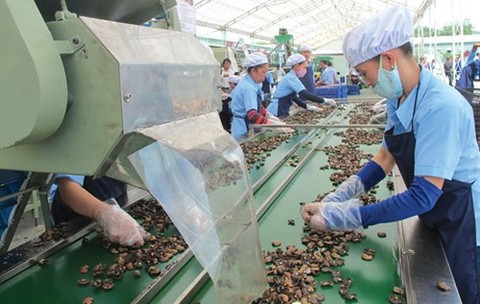
A cashew processing line for export. Four sub-sectors of cashew, rice, vegetable processing and fruit processing would benefit from the eco-fair project. — Photo vinacas.vn
A project promoting the supply and demand of eco-fair agri-food processing products in Viet Nam was officially launched in Ha Noi on Tuesday.
The project is also expected to contribute to economic prosperity, poverty reduction, the development of sustainable livelihoods and a green economy for a transition towards a low-carbon, resource-efficient and circular economy in Viet Nam.
Funded by the European Commission, Viet Nam Rural Industries Research and Development Institute (VIRI) will co-operate with other organisations such as the Centre For Creativity and Sustainability (CCS), Viet Nam Cleaner Production Centre Co Ltd (VNCPC) and Funzilife Ltd. to implement the project.
The Eco-Fair project targeted to achieve the Millennium Development Goals (MDGs) such as no poverty, equality and responsible consumption.
Speaking at the launching ceremony, Nguyen Bao Thoa, VIRI’s director, said: “Eco-fair products are reputable in regard to their quality and health benefits, and consumers can use them safely. Consumption of sustainable products gives consumers the feeling of doing something meaningful and represents the demonstration of positive values in changing the negative trends of modern-day human consumption. They help to reduce the negative impacts of human consumption on many aspects of the natural environment such as pollution, soil erosion, and shortages in resources. By choosing these products, consumers help to change the mindset of society in general and contribute to the promotion of sustainable development for generations to come.”
In many countries, eco-agriculture and fair trade are emerging as a rewarding agricultural development strategy. The newly signed EVFTA (European Union-Viet Nam Free Trade Agreement) between the EU and Viet Nam has a specific clause related to promoting eco-fair products in the context of many existing challenges.
“Eco-fair products are those which have achieved sustainability certification focusing on environmental and social aspects,” she added.
Businesses participating in the project therefore could improve their brand image, demonstrating corporate responsibility towards the environment and society. They could build a safe and equal working environment for employees, improving labour productivity. More importantly, they would meet the increasing requirements of customers for environmentally and socially responsible products as well as building their capacity for sustainable production and market promotion.
The project expected to provide training for 1,000 micro, small and medium enterprises (MSMEs). Some 200 MSMEs would be quickly assessed on RECP while another 200 eco-fair products would be commercialised; 500,000 consumers would be reached with awareness raising courses; 100 MSMEs would be supported in accessing green finance, new product development, clean technology and Eco-Fair certification.
In addition, firms achieving the Eco-Fair certificate would be connected with customers whose demand to buy sustainable products worldwide with expected sales increased by at least 30 per cent for four sub-sectors of cashew, rice, vegetable processing and fruit processing. — VNS